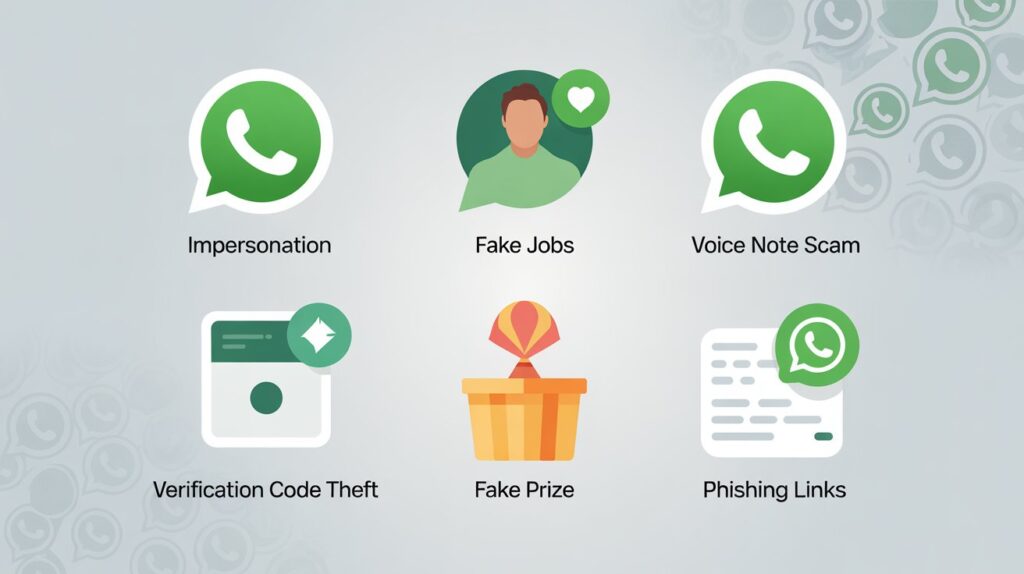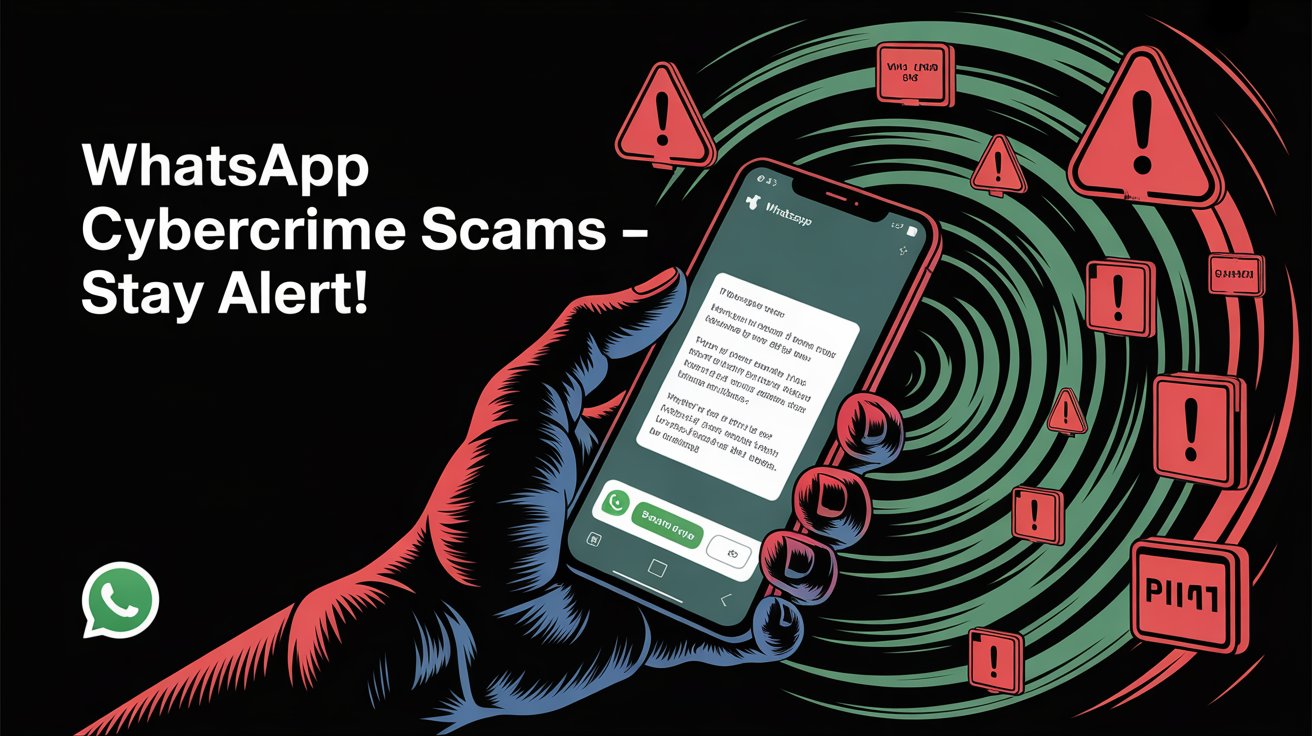In today’s digital world, WhatsApp has become one of the most popular communication tools with over 2 billion active users globally. But with its popularity comes a dark side—cybercriminals are exploiting WhatsApp to scam, manipulate, and steal from innocent people. From impersonation scams to malicious links, WhatsApp has turned into a dangerous playground for cybercrime.
At Scam Free World, we’ve received hundreds of messages and reports from victims across the UK and USA who’ve fallen prey to cunning WhatsApp cybercrime scams. In this blog, we’re breaking down how these scams work, the red flags to watch out for, and—most importantly—how to protect yourself and your loved ones.
🔍 What Are WhatsApp Cybercrime Scams?
WhatsApp cybercrime scams are fraudulent activities carried out via the messaging app, often involving tricking users into sharing personal, financial, or sensitive information. These scams can include phishing links, fake job offers, impersonation of friends or family, romance fraud, and even voice note scams powered by AI voice cloning.
In many cases, the scam starts with a simple message:
“Hey Mum, I’ve got a new number. Can you help me out with something quickly?”
Before you know it, the victim has sent hundreds or even thousands of pounds, believing they’re helping a loved one in distress.
📊 Alarming Rise of WhatsApp Scams in the UK
The UK has seen a significant spike in WhatsApp-related scams since 2023. According to Action Fraud:
- Over 13,000 cases of WhatsApp impersonation scams were reported in the last 12 months.
- The average victim lost between £800 and £2,500.
- Scammers often pose as family members, friends, or even government officials.
Many scams have become highly convincing, using AI-generated voices, deepfake images, and cloned WhatsApp profiles to dupe even the savviest users.
🧠 Why WhatsApp Is a Prime Target for Cybercriminals
- Encryption gives a false sense of security
While WhatsApp uses end-to-end encryption, scammers exploit user trust, not the technology. - Wide user base
With billions of users, it’s an attractive platform for scammers to cast a wide net. - Quick sharing of files, links, and contacts
Makes it easy to spread malware or phishing links. - Low verification for account setup
It only takes a phone number to create an account, making impersonation easy.
⚠️ Common Types of WhatsApp Cybercrime Scams
Here are the most prevalent types of WhatsApp scams in 2025:
1. Family Member Impersonation Scam (“Mum/Dad” Scam)
- A scammer pretends to be your child using a new number.
- They claim their phone is broken and urgently need money.
- Often includes emotional manipulation (“I’m stranded”, “I’m in trouble”).
Real Case:
A UK mother sent £1,200 to what she believed was her daughter’s new WhatsApp number. It turned out to be a scammer using publicly available information from social media.
2. WhatsApp Verification Code Scam
- Scammer convinces you to share a 6-digit verification code.
- Once shared, they gain access to your WhatsApp account and lock you out.
- They then message your contacts asking for money or sensitive info.
Tip:
Never share your WhatsApp verification code—not even with friends or family.
3. Job Offer and Work-From-Home Scams
- You receive a WhatsApp message offering high-paying jobs or “easy money”.
- They lure you into paying registration fees or sharing bank details.
- Some scams trick users into crypto investments or Ponzi schemes.
Warning Sign:
If it sounds too good to be true, it usually is.
4. Romance and Dating Scams
- Scammers build emotional connections and gain trust over time.
- They eventually request money for emergencies or travel.
- WhatsApp becomes the preferred platform after matching on a dating site.
5. Fake Prize and Lottery Scams
- You get a message claiming you’ve won a prize from WhatsApp, Amazon, or even the UK government.
- To claim, you must click a link or provide personal details.
- The link may install malware or steal your data.
6. Voice Note Scams (AI Voice Cloning)
- Scammers send fake voice messages that sound like someone you know.
- Powered by AI tools, these voice notes are scarily convincing.
- Often used to request money transfers in emergencies.
7. Government or Police Impersonation
- Fake accounts pretend to be HMRC, UK Visas and Immigration, or local police.
- They threaten arrest, fines, or legal action if you don’t pay immediately.

🧭 How to Identify a WhatsApp Scam: Red Flags
- 🚩 The sender asks for money urgently.
- 🚩 The message comes from a new or unknown number.
- 🚩 Poor spelling and grammar.
- 🚩 Requests for verification codes, passwords, or bank details.
- 🚩 You are asked to click on suspicious links or download unknown files.
- 🚩 The story doesn’t quite add up, even if the voice or photo seems familiar.
🛡️ How to Protect Yourself from WhatsApp Scams
✅ 1. Enable Two-Step Verification
- Go to Settings > Account > Two-Step Verification.
- Add a 6-digit PIN and email for extra security.
✅ 2. Never Share Verification Codes
- These are the keys to your account. Keep them private.
✅ 3. Verify Requests with a Phone Call
- If someone asks for money, call them on their original number first.
✅ 4. Don’t Click on Suspicious Links
- Even if it appears to come from someone you know, double-check first.
✅ 5. Report and Block Suspicious Accounts
- Tap on the message > More > Report > Block.
✅ 6. Educate Family and Friends
- Especially older family members who may be more vulnerable.
📝 What to Do If You’ve Been Scammed
- Immediately inform your bank.
- You may be able to reverse the transaction if acted upon quickly.
- Report to Action Fraud (UK) or FTC (USA).
- Website: www.actionfraud.police.uk
- Inform WhatsApp.
- Go to Settings > Help > Contact Us and report the scammer’s number.
- Notify your contacts.
- Warn others if your account was hacked and messages sent to them.
- Change passwords.
- Especially if you used the same credentials elsewhere.
💡 Real Victim Story: “They Cloned My Daughter’s Voice”
In May 2025, a woman from Manchester received a WhatsApp message from a new number claiming to be her daughter. A few seconds later, she received a voice note, tearful and pleading for money to get out of an urgent situation. The voice was eerily identical to her daughter’s.
She wired £2,000 before realising she’d been duped. The scammer had used AI voice cloning and public Instagram videos to mimic her daughter’s voice.
This is the chilling future of WhatsApp scams.
🌐 WhatsApp and Meta’s Role
While WhatsApp provides basic tools to report and block scammers, many critics argue that Meta (WhatsApp’s parent company) needs to do more. Cybersecurity experts urge them to:
- Increase identity verification.
- Detect suspicious patterns and AI scams faster.
- Educate users with in-app warnings.
Until then, it’s up to us to stay vigilant and informed.

👮 How to Report a WhatsApp Scam in the UK and USA
🇬🇧 UK Reporting Channels:
- Action Fraud: actionfraud.police.uk
- WhatsApp Support: Open WhatsApp > Settings > Help > Contact Us
🇺🇸 USA Reporting Channels:
- Federal Trade Commission: reportfraud.ftc.gov
- WhatsApp Help Center: faq.whatsapp.com
📣 Final Thoughts: Stay Alert, Stay Safe
WhatsApp has made life more convenient, but it has also created new dangers. Cybercriminals are evolving, and the scams are getting more believable by the day. Your best defence? Stay informed, stay sceptical, and talk about scams openly with family and friends.
At Scam Free World, we’re committed to helping people in the UK, USA, and beyond stay one step ahead of scammers. Bookmark our blog, share this article, and follow us for real-time scam alerts.
Read more scams – https://scamfreeworld.co.uk/qr-code-scam-alert/




